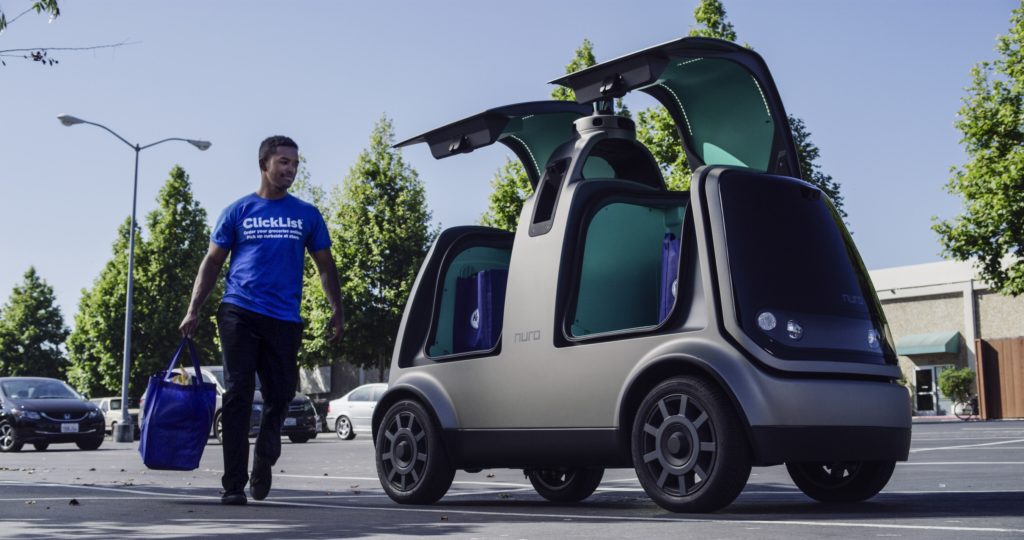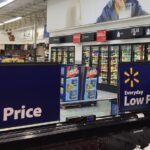
They’re two of the biggest trends you’ve been hearing about lately – grocery delivery, and self-driving cars. So it was only a matter of time before someone combined the two. In this case, it’s two big someones.
Kroger and Walmart have both begun tests of grocery delivery services using self-driving cars – but in very different ways. Kroger’s system uses self-driving cars to bring your groceries to you. Walmart’s system uses self-driving cars to bring you to your groceries.
Kroger began its test in Arizona yesterday, partnering with the driverless vehicle company Nuro to deliver groceries from a single Fry’s store in Scottsdale. Nuro’s fleet of self-driving vehicles hit the road yesterday, bringing grocery orders to local residents who place their orders online. There’s a $5.95 flat fee for delivery, with no minimum order. Digital coupons can be added to your order as you shop online, but paper coupons are not accepted.
It’s the future, after all – cars can drive themselves, so who needs paper coupons anymore??
Whether it’s due to the novelty of the idea, or because Scottsdale residents don’t want to go out in the summertime heat to grab their groceries, the service appears to be wildly popular already. Visitors to Fry’s website are normally able to choose a delivery window to have their groceries delivered within hours. But in the area where the Nuro delivery service is available, Fry’s website now shows there are no delivery time slots available within the next three days.
So if you really, really need some food in Scottsdale, you may have to make the trip to the store – unless you want to wait a few days just for the fun of seeing a self-driving car show up outside your door.
For now, Nuro will use retrofitted Priuses to make deliveries. This fall, it will start using custom-made vehicles specially designed to carry groceries. The R1 vehicle, pictured above, “is lighter than a passenger vehicle, narrower and more nimble, and operates at lower speeds,” Nuro explains. “While we complete the R1’s final certification and testing, the Priuses will be completing deliveries and helping us improve the overall service.”
Both Kroger and Nuro are emphasizing that this is a test, and they plan to learn from it before implementing it more widely.
“Kroger wants to bring more customers the convenience of affordable grocery delivery, and our pilot with Nuro will help us test and learn to understand customer acceptance of autonomous vehicles,” said Kroger Chief Digital Officer Yael Cosset. “Since self-driving delivery vehicles are a new concept for many, this phase of the pilot is very important,” Nuro added. “We will learn how customers interact with the vehicles in real-time, and be focused on identifying further improvement opportunities.”
Walmart, meanwhile, is conducting its own test in the Phoenix area, working with the driverless car company Waymo. But it won’t use Waymo’s fleet to deliver groceries – instead, Waymo vehicles will be dispatched to shoppers’ home to ferry them to the local Walmart, where staffers will load up the vehicle and send it on its way.
“Riders spend a significant portion of time each week running errands and shopping,” Waymo explained. So its partnership with Walmart is designed “to make shopping more convenient”.
Walmart doesn’t have a digital coupon program. So if you want to use coupons to save money on your online order, you’re out of luck – because Walmart also doesn’t accept paper coupons for its grocery pickup service. But if you’re driven to the store in a driverless car that shows up at your door, at least you’ll save a little gas money.
A third program, introduced earlier this year, offers still another take on how best to use driverless cars in grocery delivery. In January, Robomart unveiled what it called “the world’s first self-driving store”. Its driverless vehicles actually contain an entire selection of grocery products. You just summon a car, it comes to your door, you take what you want, pay, and the car drives off.
Robomart’s vehicles aren’t on the road just yet – it plans to begin testing them in the fall. Kroger’s program is also a test, but it does hope to expand it after a while. Walmart’s program, however, is billed as a “limited” test with an expiration date attached. After that, Walmart will examine its effectiveness and may or may not decide to introduce it more widely.
But the mere fact that we’re talking at all about groceries delivered via driverless vehicles, suggests that we’re on the cusp of a very different future when it comes to how we shop for our groceries. If these tests become permanent programs, and driverless cars filled with food become commonplace, the notion of walking into a grocery store to do your shopping may become just as old-fashioned as, well, paper coupons.
Image source: Kroger/Nuro










